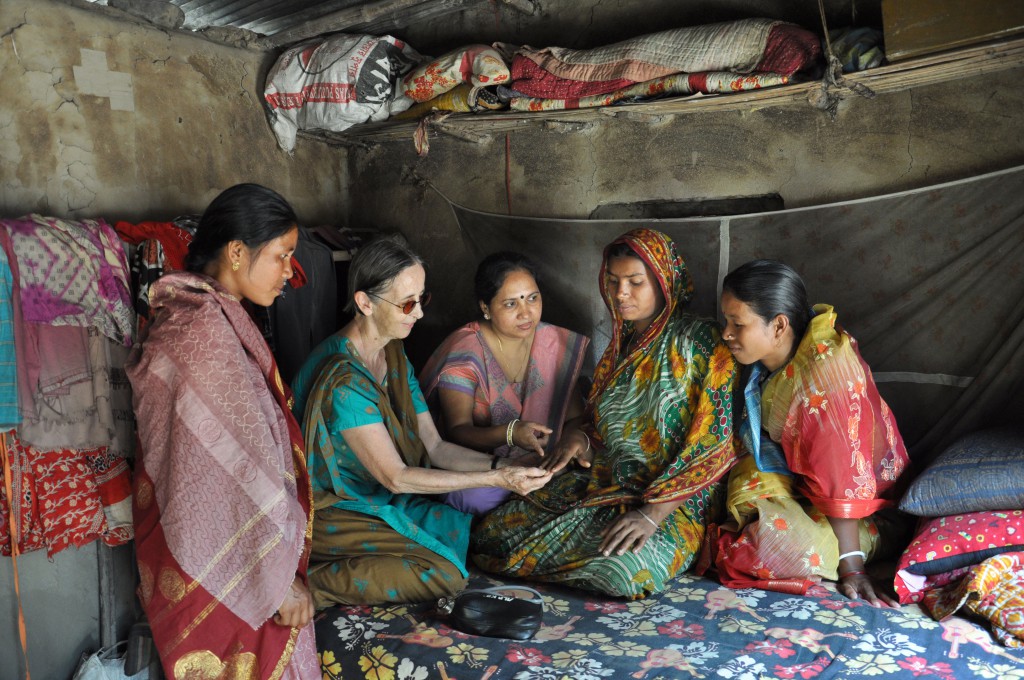
Salma, 18, lives in Fulbaria in the heart of Bangladesh. When she and her husband, Masud, found out they were expecting their first child, Salma was experiencing abdominal pain, couldn’t eat and was very sick; they were both concerned.
Some villagers told her sickness and a loss of appetite was a sign the baby could be abnormal.
“I had also heard that pregnancy is very difficult with lots of problems; that some pregnant women had convulsions and needed an operation or could die,” said Salma.
With little money, going to hospital was beyond their reach so they sought care from the village’s elderly traditional birth attendant. But Salma was frightened by the villagers’ stories and did not feel comforted by the birth attendant.
When she was six months along, Salma was told about Pronoti, a local woman who knew a lot about pregnancy.
Salma also heard that women who delivered under Pronoti’s care did not end up with a prolapsed uterus, as was common in the area.
Nor did their infants die within the first week of life from pneumonia or birth asphyxia (lack of oxygen during the delivery).
“We went straight to her place but when I saw her blood pressure machine, I was nervous. I thought that she must be a doctor and it might cost us a lot of money. I had no idea what a pregnancy check-up was like,” said Salma.
“However, as Pronoti checked my abdomen gently, looked at my eyes and finger nails and took my blood pressure, I started to relax. She said my baby was fine and the abdominal pain was due to constipation.”
During this first antenatal check-up, Salma was advised to drink lots of fluid and eat fruit.
She was also told to eat more food so she and her baby would be healthy.
“These words surprised me, as we were always told to eat less during pregnancy so we would not have a big baby. Her words reassured me,” said Salma who was also informed that she was anaemic and to include iron rich foods in her diet.
As 70 per cent of pregnant women in Bangladesh are anaemic, this affects the nutrition of the unborn child and makes the mother more likely to develop a postpartum haemorrhage, the main cause of maternal mortality in Bangladesh.
Trained by Caritas Bangladesh’s Safe Motherhood Project (SMP) which is supported by Caritas Australia, Pronoti has the knowledge and practical skills to conduct comprehensive antenatal and postnatal care, as well as carry out normal deliveries at home.
Emphasis is given to recognising danger signs so that timely referral to hospital is possible.
Following her advice, Salma soon started to feel stronger and, when she did go into labour, just knowing that Pronoti was there gave her a feeling of peace and wellbeing.
Pronoti’s gentle, respectful manner allowed Salma to relax and, after a 12-hour labour, Maya was born.
“I felt amazed that my baby was so healthy and that I had given birth without any problems.”
Salma can now see that some methods practised by the local traditional birth attendant, such as pushing down on the abdomen during labour, are harmful to pregnant women: “Looking back, I can see that we are at the mercy of the superstitions of fellow villagers and ignorant of danger signs.”
Sister Julienne Hayes-Smith, SMP Coordinator, said that wherever she travels in the SMP communities, people tell her the number of maternal deaths has greatly decreased.
“The fact that no woman has died under the care of our midwives is proof that our project activities work.”
Pronoti enjoys being able to make women’s lives better. “I would like to thank the people of Australia for all the help you have given us already.
We are poor but we want women and babies to have good lives, like in your country. Please help us do that.”
Your donation to Caritas Australia’s Project Compassion helps us care for children, women and men in over 30 countries worldwide.
To donate, support or fundraise for Project Compassion 2013, please visit our website at www.caritas.org.au/projectcompassion or Ph: 1800 024 413